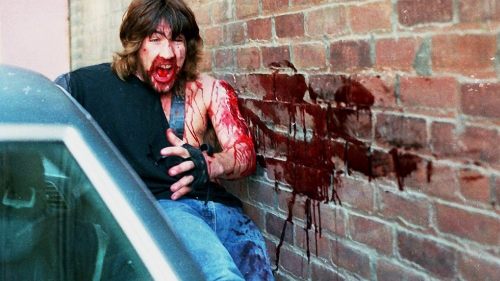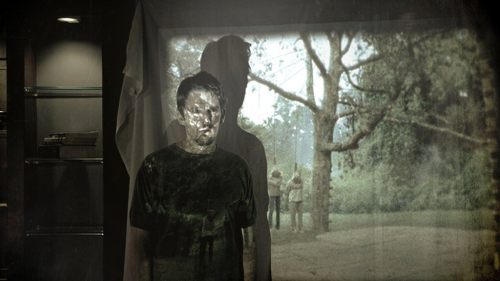The Savage Stack - VIGILANTE (1983)
There’s always going to be – for lack of a better term – a stack of films we’ve been meaning to get to. Whether it’s a pile of DVDs and Blu-rays haphazardly amassed atop our television stands, or a seemingly endless digital queue on our respective streaming accounts, there’s simply more movies than time to watch them. This column is here to make that problem worse. Ostensibly an extension of Everybody’s Into Weirdness (may that series rest in peace), The Savage Stack is a compilation of the odd and magnificent motion pictures you probably should be watching instead of popping in The Avengers for the 2,000th time. Not that there’s anything wrong with filmic “comfort food” (God knows we all have titles we frequently return to when we crave that warm and fuzzy feeling), but if you love movies, you should never stop searching for the next title that’s going to make your “To Watch” list that much more insurmountable. Some will be favorites, others oddities, with esoteric eccentricities thrown in for good measure. All in all, a mountain of movies to conquer.
The next few entries (seventy-eight through eighty-one) are going to be a somewhat modified iteration of the Savage Stack. This week, it's Fantastic Fest 2018! To celebrate, I wanted to pen a string of articles celebrating the filmography of Bill Lustig, whose landmark slasher Maniac is being presented via its new 4K restoration. So, I'm counting backwards to 1980 with some of my favorite works from the grindhouse king.
The third installment features Lustig's very own "Italian Death Wish": the brutal street gang opus, Vigilante...

The opening monologue of Bill Lustig's Vigilante (delivered by the one and only Fred Williamson) is a call to arms:
"Hey, I don't know about you guys, but me...I've had it up to here. There are some 40-odd homicides a day on our streets. There are over two million illegal guns in this city. Man, that's enough guns to invade a whole damn country with. They shoot a cop in our city without thinking twice about it. Aw, come on. You guys ride the subway. How much more of this grief are we gonna stand for? How many more locks we gotta put on our goddamn doors?
Now, we ain't got the police, the prosecutors, the courts or the prisons. I mean, it's over. The books don't balance. We are a statistic. Now, I'm tellin' ya, when you can't go to the corner store and buy a pack of cigarettes after dark...because you know the punks and scum are out there on the streets when the sun goes down, and our own government can't protect its own people, then I say this, pal: you got a moral obligation, the right of self-preservation. Now, you can run, you can hide, or you can start to live like human beings again. This is our Waterloo, baby! You want your city back? You gotta take it. Dig it? Take it!"
Vigilante was partially born from Bill Lustig's love of Italy’s poliziotteschi cousins to Death Wish ('74) - portraits of urban decay and diseased morality that infected the common working man, causing them to pick up a weapon and take justice into their own hands (think: Enzo Castellari's Steet Law ['74]). By '82, the director’s beloved Times Square had seen its glory days come and go, experiencing the NYC equivalent of "free love" in sex, porno and low budget filmmaking (that flooded The Deuce's grimy theaters), before giving way to a wave of crime and punishment that made walking the streets an unsafe bet for pretty much anyone who lived in the Big Apple. Following his moderate success with Maniac ('80), Lustig desired to craft a response to this decline, while still remaining in the realm of entertaining exploitation.
However, Lustig's ambitions got the better of him somewhat while making Vigilante, as he wanted to build a bigger picture than Maniac, while still keeping that work’s DIY guerilla tendencies alive. This led to a significantly higher budget, though funding wasn't as easy to acquire as the director first believed it would be. The investors Lustig and co-producer Andrew Garroni had sought out for his (non-pornographic) feature debut weren't as keen to return as they'd counted on, despite Maniac being profitable on paper due to Cannes Film Market presales alone. The production sought alternative sources of revenue – such as friends, family, and even the owners of NY's famed Carnegie Deli – shooting certain scenes (such as Williamson's introductory screed) for free using Kodak "camera tests", and even ran out of funds and had to suspend shooting at different points during production.
Though Vigilante follows a rather straightforward revenge plot, Lustig saw it more as a sociopolitical statement regarding the state of New York City during the '70s, and a time capsule that preserves a look at what the five boroughs’ streets truly looked like. Beyond the militant street gangs (fronted by Salsa legend Willie Colón) that act as the movie's central antagonists – murdering the pre-teen son (Dante Joseph) of blue collar everyman Eddie Marino (Robert Forster) before beating his wife (Rutanya Alda) into a coma – corruption climbed the ladders of power and sat supreme in the halls justice, creating greedy monsters out of cops, scummy lawyers (including one awesome dirtbag played by Joe Spinell), judges and City Hall officials. Lustig's vision of a pre-Giuliani metropolis is an utter nightmare, shooting in dilapidated locations that would later be bulldozed, allowing high-end condominiums to be erected in their place.
Fred Williamson's Nick – along with the crew of working class thugs he heads – are the fascist byproduct of this utterly broken system, as they go about cleaning up their streets in the most aggressive ways possible. At first, Eddie rejects this underground cadre of urban avengers (who're essentially concrete players from some lost spaghetti Western Lustig had in his head for years), thinking that the rule of law will obviously fall in his favor. But after the men who butchered his family are set free, and he's ironically thrown in Rikers Island for screaming at the judge (earning him a "contempt" charge), it's clear that Nick's mode of brutal operation is the only way to get things done. Hell, Eddie barely survives his short stint behind bars, as a hardened lifer (Woody Stroud) takes a special interest in keeping the wronged man safe from a pair of predatory cons looking to make Marino their bitch.
Forster wasn't Lustig's first choice to play Eddie, as the budding grindhouse genius was a fan of Dario Argento, and had even just worked on the horror maestro's Suspiria ('77) sequel, Inferno ('80). In fact, Lustig wanted Bird With The Crystal Plumage ('70) star Tony Musante to front Vigilante, and had even recruited the actor, entering the throes of pre-production when Musante called a meeting with the filmmaker and Garroni, demanding that he and his wife (Jane Sparks) be able to rewrite the script. Lustig was game at first, but as the process went along, Musante took Vigilante in directions that didn't tickle his perverted fancy, so the production parted ways and signed Forster, who'd just starred in one of the director's recent favorites, Alligator ('80).
While many modern cinephiles probably associate Forster with his post-Jackie Brown ('97) output, Vigilante is just one of many entries on the actor’s long exploitation resume. On top of Alligator, Forster would play everything from a Middle Eastern terrorist in The Delta Force ('86) to Captain Jack Bitters in Scanner Cop II ('95). Eddie Marino began a long working relationship (not to mention friendship) between Forster and Lustig, as he'd later appear in Maniac Cop 3: Badge of Silence ('93) and make a glorified cameo as a corrupt politician in Uncle Sam ('97). Yet Vigilante stands as one of the great moments of the actor's genre career, as his hardened, weathered looks and thousand-yard stare go a long way toward selling us on the eventual damnation of Marino's soul. He's Charles Bronson without the glorification: a taxpaying stiff pushed too far, until all that’s left is provoked viciousness.
Like all of Lustig's movies, there's a relentless cruelty to the violence that doubles as a commentary regarding life’s injustice. As easy as it is to view the street gangs who terrorize the town as cartoonish representations of a real world problem, Lustig practically treats them as a natural disaster: a consequence of an ecosystem that was bankrupt, both literally and spiritually. Just like Spinell's hulking, sweaty madman in Maniac, they could strike anywhere, at any time, not requiring any kind of motive in order to enact their murderous will against the innocent. It's just Wednesday, and you happened to be in their way. This randomness actually strengthens Vigilante as a portrait of urban decay, the streets gangs becoming the barbarians who rule in this spray-painted jungle, earning a living and getting their depraved kicks via wanton savagery that their town often turned a blind eye to.
From a technical perspective, Vigilante is a shaggy but impressive piece of craft, as James Lemmo's downtown photography evokes the same classic period of NYC Grime as his work on Abel Ferrara's Ms. 45 ('81). Exteriors are lit on the fly, creating RKO-style shadows beneath overpasses, as our anti-heroes continue their crusade against the city's evil armies. Gunshot victims fall backward in slow motion, as blood squibs spray across the night's thick blackness. Equally impressive are Jay Chattaway's themes, which evoke the chugging, electric guitars of lesser known Morricone tracks. Lustig cops to thinking some of the action is underwhelming, but all the DIY car chases and crashes are that much more thrilling, knowing what sort of limitations they were working with.
Lustig hoped that the ending of his movie would evoke I Am A Fugitive From A Chain Gang ('32), as Eddie negates any possible catharsis derived from his acts of vengeance by coldly detonating a judge's car. Apparently, there was originally a title card that explained how Marino was caught and imprisoned, but audiences hated it so much that the legend was removed. If anything, the response proved that Vigilante had hit a nerve with a certain type of low brow consumer. They wanted avenging angels like Paul Kersey and Eddie Marino to be wandering the streets, looking out for their safety, because they damn well knew nobody else would. It's a chilling notion, and a testament to the raw truth the movie's maker had managed to bottle up and sell to his own brand of degenerates.
Vigilante is available now on Blu-ray, courtesy of Blue Underground. And if you haven't snagged a badge for Fantastic Fest, you should totally do so here!



